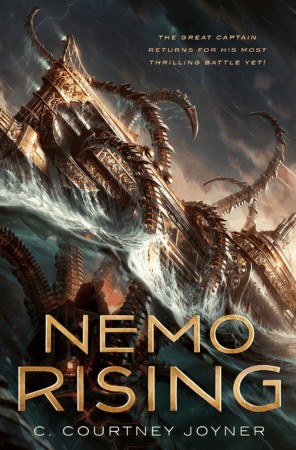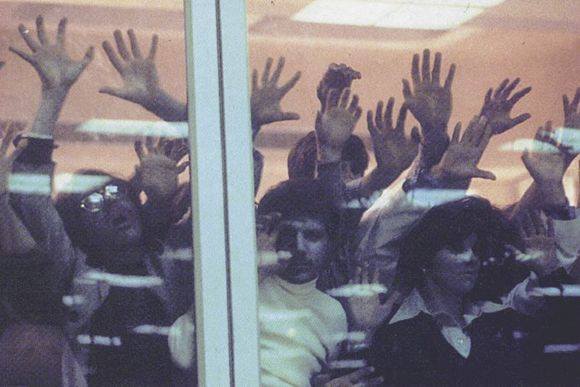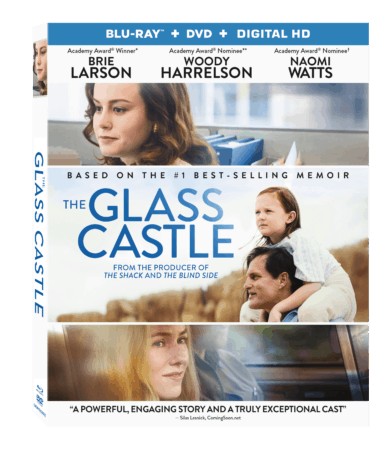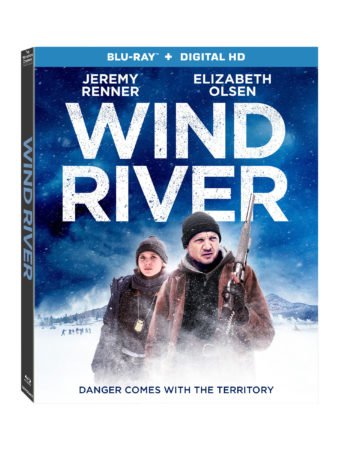ANDERSONVISION: What made you transition from screenplays to novels?
C. COURTNEY JOYNER: I was a kid during the paperback explosion of the 60’s; looking through that spinning rack of Conan – with Frank Frazetta covers – Doc Savage, Tarzan, stacked alongside Donald Hamilton, Alistair MacLean, Ross MacDonald, and Elmore Leonard – what was better than that? I devoured those books, but love of movies was always my big motivator, so the concentration was on screenwriting. Getting something made, and working in film – that was the long-distance goal. Flash-forward a few decades – more than a few – and I had some movies behind me, worked for a lot of companies, and sold some stuff. But along the way, the horror and lower budget film world began to shift – money was getting tighter as the home market/physical media world was shrinking in terms of fees – and the assignments for those flicks weren’t coming in anymore, and the bigger studio things I’d worked on weren’t made. I had some specs, including westerns, but they mostly in a state of limbo on my bookshelf. So, I decided, to take the plunge into fiction; take a chance with a form – and the genres – I’d always loved, and hopefully, again have the creative satisfaction of the writing, if nothing else. And, at that point, there was nothing else! Trying to write fiction – focusing on it – certainly wasn’t money motivated, because there was less dough in fiction than in film! Actually, let’s say none. And the films weren’t happening – so, it felt like starting over, and, sounding a bit pretentious, that’s truly what I needed.
And, I love westerns, so that’s where I decided to try my hand, hoping against hope to get on “the spinning rack.”
I’d been able to join the Western Writers of America because of my film journalism, and was greeted with incredible, welcoming, support about attempting fiction from all these writers I’d admired. So I started working on some short stories, and they were sold to anthologies put out by excellent publishers – LAW OF THE GUN was one of the first – so I was very, very fortunate, and slowly, that led to the novels, thanks to my editor at Kensington, Gary Goldstein, who gave me a contract to write SHOTGUN, after hearing the pitch. The problem – I’d done some short stories, but never a novel in my life! So the first book was my first, true attempt – and away we went, except this was all years-in-the-making.
AV: Why dip a toe in the world of Jules Verne?
JOYNER: The movies. Like a lot of us, we discovered Wells, and Verne, and Stevenson first through the great films made from their works, before ever cracking a book. At least, I did. I loved, as does everyone, the amazing Richard Fleischer version of 20,000 LEAGUES, but it was MYSTERIOUS ISLAND that really pushed me to Verne. I saw it in the theater, in a re-issue, and those great Harryhausen creatures, Herbert Lom’s Nemo, and Cy Endfield’s skills – just thrilling. And when I saw the books on the shelf at my school library, or at home, I grabbed them. Verne wasn’t always the easiest read – but those technology predictions that all came true – and his eye for detail just captured me
I also got very interested in the differences between what he wrote, and the way it was interpreted for the movies – which went pretty afield sometimes, and I’m definitely including my NEMO RISING in that category! But I think his spirit is there, even in the action-approach that I took. I surely hope so.
So, almost 20 years ago, I wrote a spec TV pilot for a NEMO action series – that was optioned, but never made, obviously. My whole thrust in writing the script was to try and capture that great spirit of adventure movies I grew up with, including all the monsters and fantasy. During all this time, we had Moore’s wondrous creations appear, which I stayed away from to avoid influence – and then, when I did read the original comic, I was relieved we’d gone in such different directions, but I loved it, because I love that world of period adventure, and re-creating it, as Nicholas Meyer did in WEST END HORROR and Joe Landsdale did with TARZAN: THE LOST ADVENTURE, which became my Bible for NEMO, in terms of tone and approach.
The past decade before the novel, working closely with producer Amy Krell, we came amazingly close to a TV series, and during that time, a wonderful writer – and my self-appointed big brother – Miles Swarthout – pushed me to write the novel, which I resisted because I was steeped in the first SHOTGUN books at that point. But, at a Wester Writers conference, I actually gave the unproduced script to an editor from Tor, and he said yes to a book version after reading it, and agreeing to the script being, essentially, the book outline. But, it all started, with a kiddie matinee in Philadelphia of a Ray Harryhausen flick, which took me to Verne on the page.
AV: Are you still writing for True West Magazine? I read your column there, but I haven’t picked up the magazine in awhile.
JOYNER: Because of SHOTGUN and NEMO, and also starting to writing screenplays again, I felt stretched pretty thin, so I turned my column over to Henry Parke, a really fine film journalist, and good friend. Henry knows his stuff, and he’s done a truly superb job. Also, he’s a buddy, and we’ve collaborated on a number of commentaries for blu-rays of westerns like BIG GUNDOWN, COMPANEROS, and the Gordon Douglas remake of STAGECOACH.
AV: How did you get involved in the world of Trancers and Puppet Master?
JOYNER: After I wrote PRISON, which Charlie Band’s Empire Pictures released, I became part of the Empire, and later, Full Moon crew. I hadn’t seen Charlie in some time after PRISON, and went to the office with a friend who was auditioning for a film (TRANCERS 2…?), and I saw Charlie and his dad in the hallway, and we had a great reunion, and a few days later, he asked me to write some new movies for him, under his deal at Paramount. I said yes, but that I wanted to direct, and he agreed – and then, Tim Thomerson, just the greatest guy and friend, campaigned for me, and Albert Band also supported my directing, and would be the producer I’d work with. So, I dove into PUPPET MASTER 3, which was first up, with Dave Decoteau directing, and he did a terrific job, and folks were very pleased with that one. So, I went right into DR. MORDRID, with Albert and Charlie directing, and then, to TRANCERS, with me directing and writing. You really went from one project to the next, as I always imagined the Universal guys did when they were making the 1940’s horrors, which I love – and, that really echoed when we shot PUPPET 3 on the Universal lot, at the “Frankenstein” village.
AV: Our site is full of horror fans. Do you have any special stories about writing Prison?
JOYNER: PRISON was a life-changer, because it started my long association with Irwin Yablans, and after the movie, Irwin was responsible for introducing me to Mark Lester, and writing CLASS OF 1999, and all the others that followed. But, on PRISON, there was a script that had been developed when Irwin was at Lorimar, and the writer had taken “Halloween in a prison” to heart, and written a slasher film. I thought that didn’t work, since inmates with knives isn’t the most unusual thing, so I said it had to be “POLTERGEIST goes to jail,” and everyone agreed. Renny and I met on that film, and we ended up being housemates – very interesting times!
When the Sly Stallone movie COBRA came out, the Chinese Theater held a “COBRA-thon,” showing it 24 hours a day its opening weekend. So Renny and I dug through our pockets, and living room couch, to get the money for the tickets and tromped down to the theater. It had started to rain, and we were like a couple of wet dogs, watching Frank Stallone and the entourage get out of their limos, and go inside. And how many years later, was Renny directing CLIFFHANGER? Hollywood, indeed.
When the PRISON script was finished, we couldn’t find a location in California, and ended up at the old territorial prison in Rawlins, Wyoming – and Irwin, Renny and I flew up there to scout – and it was amazing. Literally every detail I’d written was there, in stone.
We had this great cast, and Mac Ahlberg shooting, but we needed a few more actors as inmates, so we actually used prisoners from the new penitentiary down the road, who were trustees. Except for one, who plays the burly cellmate to the young convict – he was in on a murder charge, because he’d killed a guy in a bar fight, but had his SAG card because he’d worked on the min-series CENTENNIAL when it was shot in Wyoming! Very interesting guy, but when the cameras weren’t turning, he had to be shackled, and an armed guard kept a weapon on him at all times. When he had to act, the chains came off.
AV READER QUESTION: Were you one of the zombies in Dawn of the Dead? A friend swears he heard it at a con, but I’m not sure.
JOYNER: Absolutely true. I’m the baby-faced zombie, in the doctor’s lab coat, and the round glasses with my face pressed against the glass at JC Penney’s. I worked on the movie a few days, and am in some scattered shots, but that’s the still I can point to, with Romero-pride.
AV: The Shotgun series is fascinating, but I have a hard time getting younger readers to pick up Western material. Why do you think that is?
JOYNER: Thanks so much for the kind words. I think of SHOTGUN as my “Jonah Hex” (the comic, not the movie!) Which goes to the problem of bringing younger readers to the western. I think there’s still the misconception that it’s an old-fashioned genre – what their father’s and grandfather’s liked – and that its stodgy, or too steeped in – sometimes racist – history. Of course, that’s just not the case, and when a young person reads something with so much comment about Native Americans, like Leonard’s HOMBRE – and it’s cool, and tough as hell – or a young girl reads Portis’ TRUE GRIT and she relates to Mattie Ross, then they’re swept away, and the preconception of what a western is, is gone. It seems like the trick is getting young people to that point, but I think it’s just getting the right books in their hands. I really do think it’s almost a matter of labeling – “Hey, you loved DJANGO UNCHAINED, so here’s the book version…”
AV: What’s next after Nemo Rising?
JOYNER: There’s a double-edition of SHOTGUN called BUSHWHACKED: THE JOHN BISHOP SHOTGUN SAGA coming out on January 15th, from Pinnacle. And then two more SHOTGUNS: THESE VIOLENT TIMES and BULLET KISSED. And, I hope to be writing a sequel to NEMO for Tor – but, wonderfully, the book has ignited the interest in the TV series again, and so that’s absolutely on the horizon – certainly the writing of a pilot derived from the novel. So, it’s been a long journey.



